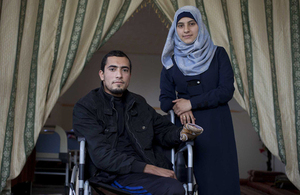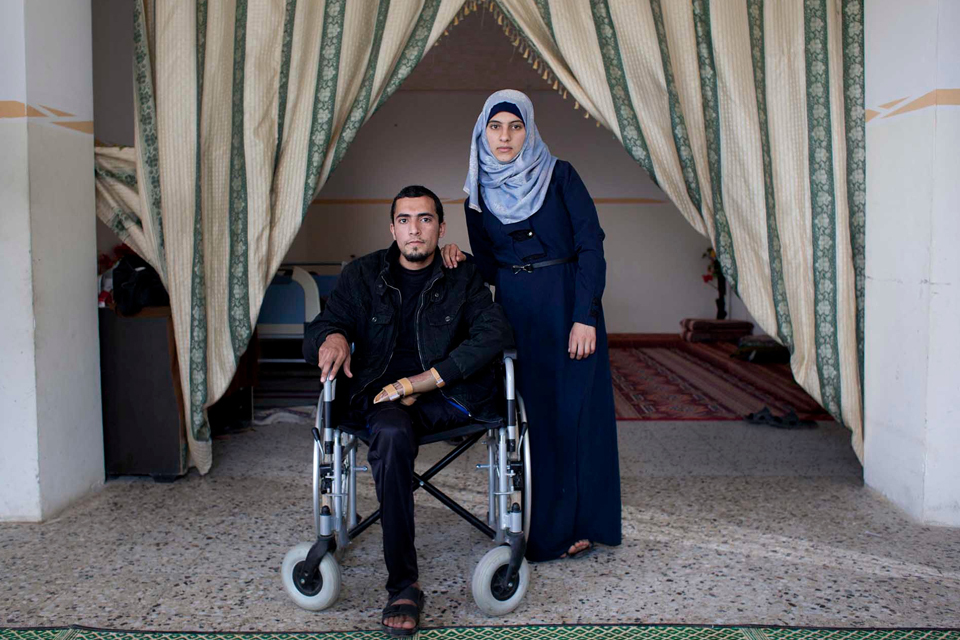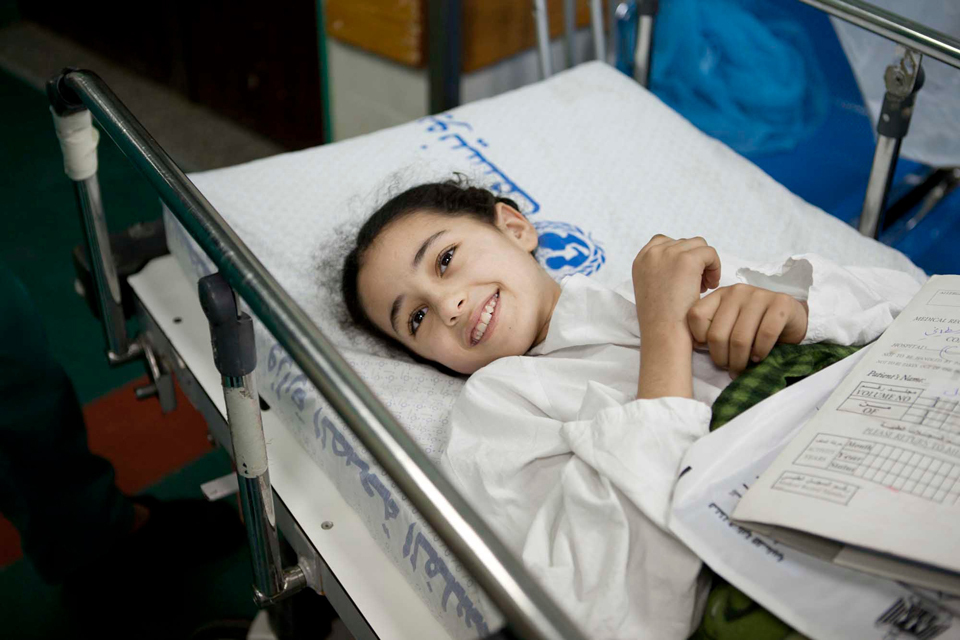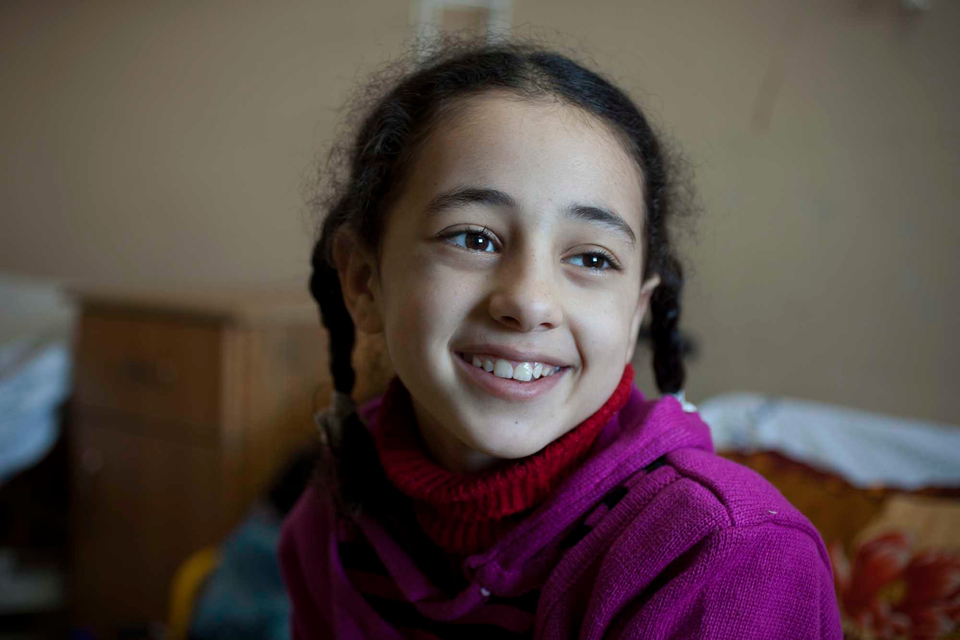Restoring hope in Gaza
Meet the NHS doctors helping to rebuild lives, 6 months on from the ceasefire.

24-year-old Abdullah and his fiancee. Abdullah was seriously injured in the 2014 conflict in Gaza. Picture: Abbie Trayler-Smith/Panos for DFID
Abdullah was on his motorbike in downtown Gaza when it happened.
He was on the way to pick up his marriage permission certificate from the court house. It was August 2014. He’d just become engaged to his fiancée and his life was about to change for ever, in a way he’d never imagined.
“I suddenly found myself flying through the air” he says.
“I found my leg bent to one side and shattered. There was shrapnel in my arm. I lost consciousness and when I came round I was in hospital. I was in intensive care for 17 days.
“The pain was unbearable.”
Abdullah had been caught in one of the thousands of explosions that rocked Gaza during the 50-day-long conflict last summer.
Most of the bones in his left arm were shattered after building debris fell on him. A second explosion caused a major injury to his right leg.
He’d become one of the most severely injured of the 11,000 casualties of the conflict. He was taken to Gaza’s Shifa Hospital, where Palestinian doctors were able to stabilise him, but he was critically ill.
His condition was deteriorating when a team of NHS doctors arrived, working with the British charities Medical Aid for Palestinians (MAP) and IDEALS, as part of an emergency humanitarian response project funded by the UK government.
“If the MAP team hadn’t come when they did, I’d be dead” says Abdullah.
“I didn’t have much time left.”

Abdullah and his fiancée at home in Gaza, 4 months after his operation. Picture: Abbie Trayler-Smith/Panos for DFID
Dr Graeme Groom, an orthopaedic surgeon from King’s College Hospital in London, was one of the team who were deployed to Gaza.
They quickly realised that, sadly, the only way to save Abdullah’s life was to amputate his leg completely at the hip. It was a complicated operation that had never been carried out there before.
Four months later, it’s nothing short of remarkable that Abdullah is able to calmly relate his own story.
“What happened, happened. I cannot change it” he says.
“Sometimes I can’t help feeling upset. But one should also be happy. I still have a big future ahead of me.”

Dr Naveen Cavale from Kings College Hospital. Picture: Abbie Trayler-Smith/Panos for DFID
Dr Naveen Cavale is another member of the team who first treated Abdullah last year. He’s a plastic and reconstructive surgery specialist, also based at King’s in London. His first visit to Gaza was in September 2014, shortly after the ceasefire.
“Abdullah was probably the most severely injured patient we came across on that first visit” says Naveen.
“It’s great to see him doing so well now. He’s back at home, he’s looking healthy and gaining weight again.
“I’m came to Gaza because this is where the need was.
“On one night alone in July there were over 200 casualties, 70 of whom needed major surgery.
“There are a lot people here now who need reconstructive surgery and ongoing care. It’s good to be working with MAP and IDEALS to try and help some of them recover.
“We’ve also been able to help the medical teams here.
“By being able to come back a number of times, by providing some training and some of the processes that we have in London, we’re helping to build capacity for the future”.

9-year-old Weam smiles as she waits to have an operation on her injured leg in Gaza's Shifa hospital. Picture: Abbie Trayler-Smith/Panos for DFID
Nine-year-old Weam is another of the patients being treated by the British doctors.
She was playing in the garden of her home with her father last summer when a rocket landed on them and exploded. She suffered major injuries to both her legs.
Her left leg had to be amputated below the knee, and now she needs a follow-up operation on her right foot.

Dr Graeme Groom from Kings College Hospital, London, assesses Weam's leg two days after her operation in Gaza. Picture: Abbie Trayler-Smith/Panos for DFID
Two days after the operation, Graeme and the team visited Weam again to check up on how she’s recovering. Despite the trauma she’s been through, she’s in good spirits:
“I’m happy because they’ve removed all the shrapnel from my leg and I feel better now. Before my leg felt very heavy and now it feels free” she says.
Weam’s mother just wants her daughter to get back to normal, like any mother would.
“I’m so thankful to these doctors giving up their time to come here and help the people of Gaza” she says.
“The facilities here are not good, there is not enough equipment and everything, but with these people coming they bring hope.
“I hope there will be no more wars making problems for our children.
“I just want to see my daughter growing up, continuing her study, playing like other kids and eventually working.”

9-year-old Weam and her mum, pictured recovering after her operatio in hospital in Gaza. Picture: Abbie Trayler-Smith/Panos for DFID
The UK’s Department for International Development provided a grant of £724,500 to Medical Aid for Palestinians, to deliver trauma support and plastic reconstructive surgery for many of those injured in the recent Gaza conflict.
Over 130 operations have been carried out over the past 6 months, and it’s estimated that up to 1,000 people in need of secondary reconstructive surgery will benefit from the project.
The project also aims to improve the surgical capacities at the Shifa and European Gaza hospitals. 50 local medical personnel will be trained to develop specialised skills to lead future specialist limb reconstructive surgeries and treatment.

Weam just wants to walk again. Thanks to the medical care of the British doctors, she might just be able to. Picture: Abbie Trayler-Smith/Panos for DFID
For Weam, it might just mean being able to walk again — at least if she’s got anything to do with it.
“When I grow up I don’t know what I want to do, but I like drawing” she says.
“I just want to have the other bit [prosthetic] for my second leg because I want to get walking again. I’m impatient to walk again.”
The MAP and IDEALS project is part of the UK’s £37 million package of assistance in response to the 2014 Gaza crisis.
The UK provided £17 million in emergency humanitarian assistance to cope with the immediate needs of those affected by the conflict, and committed a further £20 million at the Gaza reconstruction conference in October to support early recovery and reconstruction in the region.
To support Medical Aid for Palestinians, visit: http://www.map-uk.org/
To support IDEALS, please visit: http://www.ideals.org.uk/